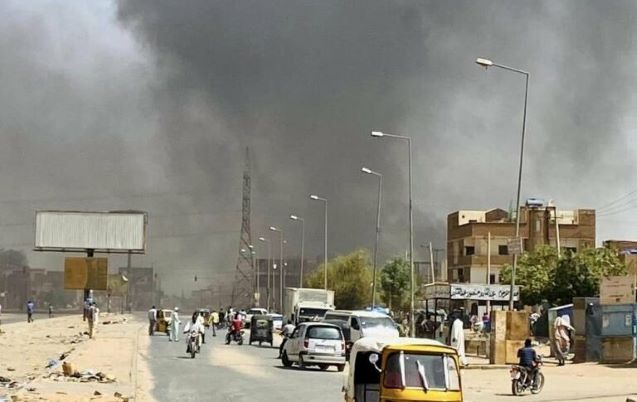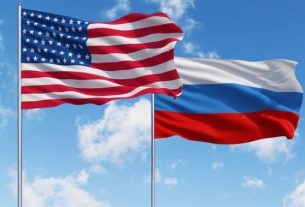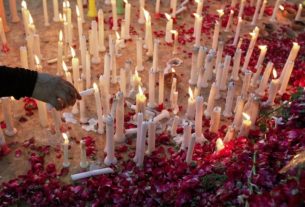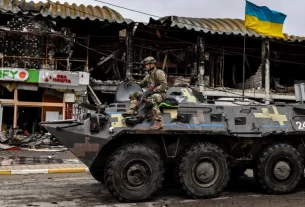A power struggle between Sudan’s army and a notorious paramilitary force has rocked the capital, Khartoum, with at least three civilians confirmed dead.
Residents dodged gunfire as rival forces battled over the presidential palace, state TV and army headquarters.
The clashes erupted after tensions over a proposed transition to civilian rule.
The army says jets are hitting bases of its opponents, the Rapid Support Forces (RSF). Both sides say they control the airport and other key sites.
Battles were also reported elsewhere in the country, including cities in the Darfur region.
The fighting is between army units loyal to the de facto leader, Gen Abdel Fattah al-Burhan, and the RSF, commanded by Sudan’s deputy leader, Mohamed Hamdan Dagalo.
Gen Dagalo said his troops would keep on fighting until all army bases were captured.
People were filmed running away and taking cover as black smoke rose over Khartoum and the unrest continued.
A Reuters journalist said there were armoured vehicles in the streets, while video showed a civilian plane ablaze at Khartoum airport. Saudi airline Saudia said one of its Airbuses came under fire.
Saudia and EgyptAir have suspended flights to Khartoum and neighbouring Chad has closed its border with Sudan.
“Shooting is still ongoing and people are staying indoors – there is so much panic and fear,” an eyewitness told the BBC via her Kenya-based sister.
Residents had not been expecting the clashes, she said, and many had been caught in transit. with bridges and roads closed and many schools in lockdown.
Duaa Tariq was speaking to the BBC when a military plane flew over her building. “They’re shooting live ammunition at the roof of the house next door and we’re just now taking shelter,” she said.
The UK, the US and the EU have all called for an immediate end to the fighting.
US Ambassador John Godfrey said he “woke up to the deeply disturbing sounds of gunfire and fighting. I am currently sheltering in place with the Embassy team, as Sudanese throughout Khartoum and elsewhere are doing”.
Russia’s embassy was also concerned by the “escalation of violence” and urged a ceasefire, Reuters reports.
The RSF claims control of at least three airports, the army chief’s residence and the presidential palace, but Gen Burhan denied this in an interview with al-Jazeera.
There are also reports of clashes at the state TV station, which eyewitnesses say is now controlled by the RSF.
Gen Dagalo, also known as Hemedti, told al-Jazeera that Gen Burhan was a “criminal” and would either be killed or “face justice”.
Earlier, the RSF had said that one of its camps in the south of Khartoum had been attacked.
For its part, the army has said that RSF fighters have been trying to seize the military headquarters.
“Fighters from the Rapid Support Forces attacked several army camps in Khartoum and elsewhere around Sudan,” the AFP news agency quotes army spokesman Brig Gen Nabil Abdallah as saying.
“Clashes are ongoing and the army is carrying out its duty to safeguard the country.”
The Reuters news agency is also citing witnesses as saying that there was gunfire in the northern city of Merowe. The RSF deployed forces near that base on Thursday as tensions increased.
Generals have been running the country, through what is called the Sovereign Council, since a coup in October 2021.
Gen Burhan is president of the council, while Hemedti is its vice-president.
But a proposed move to a civilian-led government has foundered on the timetable to integrate the RSF into the national army. The RSF wanted to delay it for 10 years, but the army said it should happen in two years.
Hemedti was a key figure in the conflict in Darfur that began in 2003 and has left hundreds of thousands dead.
Western powers and regional leaders had urged the two sides to de-escalate tensions and to go back to talks aimed at restoring civilian rule.
There had been signs on Friday that the situation would be resolved.
The 2021 coup ended a period of more than two years when military and civilian leaders were sharing power. That deal came after Sudan’s long-term authoritarian President Omar al-Bashir was overthrown.
There have been regular pro-democracy protests in Khartoum ever since the coup.__BBC.com





